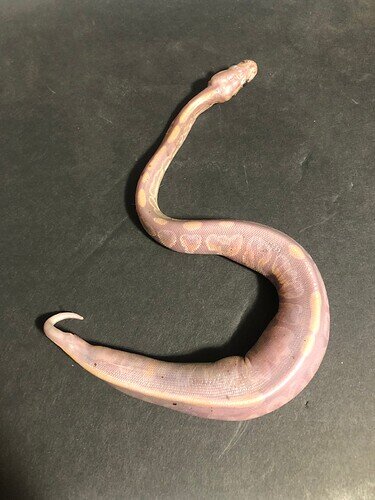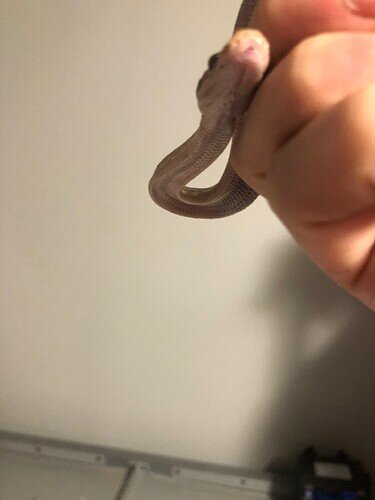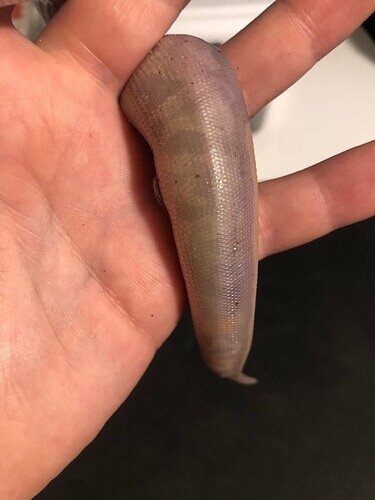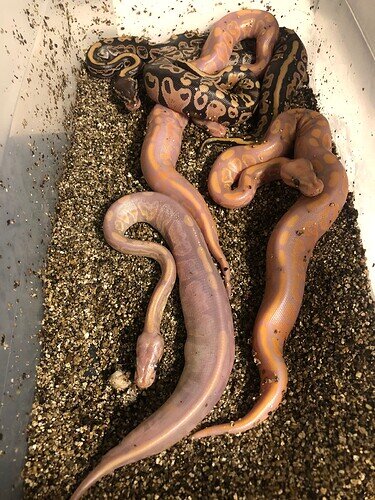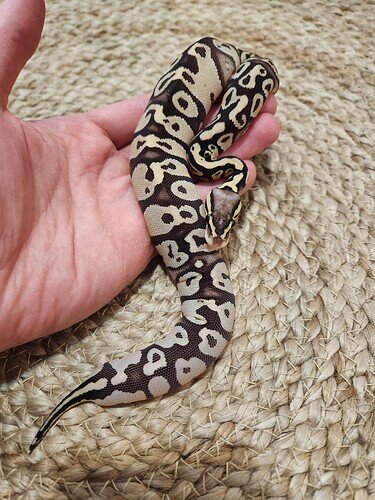Need some help, has anyone seen anything like this before? I’m worried about the under color, tiny head and skinny neck, the belly isn’t hard. This is the mothers first clutch. From Banana Orange Dream Pied 50% het ghost x Black pastel 66% het pied 66% het lavender albino
Honestly it’s difficult to say what will happen with that one. Hopefully someone else will step in with some additional advise or experience with one this swollen. My takes on it:
That belly is very distended, but the skinny neck is a sign that the yolk may not have been properly absorbed and that there may be other underlying issues.
Do you know if this hatchling still had a lot of yolk leftover in the egg? Otherwise, while it may not be hard belly, it can still be a softer mass in the abdomen. It’s a small chance, but they may start absorbing it still and reduce in size over the next couple of days.
If you do have a good reptile vet nearby, they may be able to do a quick ultrasound or needle biopsy to get a better idea of what’s going on… If not…
Keep an eye on how active this baby is. While I didn’t have any swelling like this, a recent hatchling of mine needed to be assist fed 2 days after hatching because it didn’t properly absorb the yolk. A very thin and small hatchling. If this baby is unable to pass stools or regurges if you do try to assist feed, it may be better to euthanize rather than wait it out longer.
The inside egg was dry, once the baby came out I gave it a few minutes in water to hydrate it as I watched. the baby does crawl fine and moves in water without issue. Water was up to its back but not higher to prevent drowning
Looks like a under developed “pin head” to me, they also can have different color or pattern as well. (It usually is really neat too!) Sometimes they do fine, will always have a small head, short neck type look. Other times they either are weak and die or try to eat and something inside may not properly work and they die. Sometimes people will say it is the keeper that cut the egg and forced it out early is the cause, but that’s not true. This may happen due to incubator temperature spikes, or just may happen sometimes for no detectable cause at all. Good luck, hope it absorbs that yolk and lives for you!
its probably a bellyful of yolk, keep the humidity up and let it develop.
Does the animal feel flaccid? Like, a lack of muscle tone in the back half? I’ve seen hatchlings come out looking like that that are partially or totally paralyzed. They don’t make it because they can’t have bowel movements. It’s either that, or the incubator was warmer than you thought and those babies hatched out too early. They all look a little bloated, which means their development was accelerated too quickly for them to absorb their yolk fully before hatching. Could be other developmental problems associated with it. In either case, keep an eye on them and keep us posted.
Today the baby passed away, I believe it to be from an incubation issue. From either internal issues or due to not breathing correctly from how small the neck was 
Sorry to hear, don’t take it too hard these things can and still happen even if everything is perfect! Creating life is complicated, and doesn’t always work. Thanks for the update though, it may help someone else dealing with the same issues. Hope all goes great for you next time!
I am inclined to believe that the issue has to do with the incubation process like a heat spike or a dramatic humidity fluctuation that detrimentally impacted the development of this animal and not something congenital
I’m wondering if that’s what I’m experiencing as well. My hatchlings looked fairly normal when they hatched but I’m running in to some of the issues mentioned above, like flaccid back half with low muscle tone and they look fat even though I’ve been regulating their food carefully. I have had 2 from the clutch suddenly die. Tested for parasites in case but nothing was found. It almost seems like they aren’t digesting and are constipated and I’ve had to help get out impacted urates on several, but I’ve been doing everything the same as I have with other clutches before, and their temps and everything check out.
Adding a picture of one of them, you can see she is very bloated looking. Any ideas what could be wrong?
They could also be having a issue called hard belly where the last of their nutrients from the yolks harden so they can not pass. I don’t know for sure if this is the case but the info; bloated back end, constipation sounds like it might be. Search up “hard belly” in baby ball pythons on YouTube there are some videos on how to diagnose and try to save some hatchlings if that’s the case. Keep us posted
Yeah i did a little reasearch on that, but I didn’t find any noticable hard lumps when feeling their bellies. And they are already a few months old. They are all eating great but majority of the 2 clutches i had this year are in a similar state. Just seem oddly swolen and fat. I havent been feeding more than a pinky once a week. Still keeping a close eye on them amd doing all I can. Hope it clears up whatever it is.
What temp did you incubate them at? Just out of curiosity
At 89-90 degrees. I did just make a new incubator this last season so I’ll be double checking it before using it again just in case.
My yellowbelly has a pretty severe pinhead, she is doing great so hopefully this offers hope
In my opinion I think that is slightly high. Then if it went over by just a degree or two it could have gotten 92 degrees. Over the years I have personally lowered my temps slightly, just in case of short term fluctuations. I incubate at 88.2 and I know some incubate even lower. Not saying that is what caused all issues, but if multiple clutches had the same issue there probably is a problem somewhere during the incubation period. Unless the same male sired both clutches, in that case there may possibly be some issues with him.
I’m in agreement with @banereptiles. If I had to guess you had some temp fluctuations that caused this, especially riding that close to the max temperature they should incubate at.
I personally incubate at 86, and it takes something like a week or so longer. But a lower risk of issues ultimately.
It’s interesting I had a clutch of bananas that all came out like that some even worse. I thought they were all going to die because they were so bad. 5 days later they were totally fine and all went on to thrive. All 3 other clutches incubated the exact same were perfect looking hatchlings
Something I also changed personally is the water type I use for the humidity
That makes sense. Yeah it was different males that sired the clutches so probably like you say something off with incubation. I’ll probably lower the temps a bit this next season and do some tests to make sure the incubator is for sure holding steady temps. Thanks for the advice!
